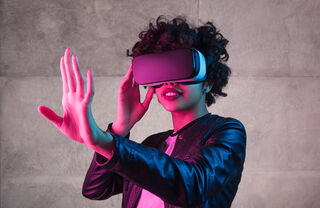Mating
Inside the Datingverse: Your Guide to Virtual Reality Dating
A deep dive into web3 and what could be the future of online dating.
Posted October 25, 2022 Reviewed by Abigail Fagan
Key points
- The Internet of the future might look entirely different from what we use currently.
- From virtual first dates to virtual reality enhanced date coaching, changes could be on the horizon for online dating.
- Virtual reality could provide an opportunity for people to interact online rather than seek partners with certain attributes.

Take a moment to imagine what online dating could look like five or 10 years from now. Will we still be swiping left and right on profiles? Or is there a better way to get to know someone? For decades, online dating has revolved around 2-dimensional (2D) profiles and messaging. Recently some platforms have started incorporating voice prompts into profiles and offering video dates, but these features are still far from widespread. Web3 and the metaverse could change the way we date online by combining blockchain technology with augmented and virtual reality (AR/VR) to create new opportunities for connection. Here’s what that might mean for the future of online dating.
Immersive VR First Dates
Already, popular dating apps like Bumble and Tinder have started toying with the idea of metaverse dating. For instance, Tinder recently scrapped plans for an in-app currency called “Tinder Coins,” which would have provided the infrastructure to reward people for things like completing their profiles or showing up to dates on time. Tinder’s parent company, Match Group, even entertained the idea of building a metaverse community called Single Town where people could meet and interact as avatars in virtual environments. New platforms are also beginning to emerge in this space such as Planet Theta, one of the first ever immersive VR dating apps.
Something that VR dating does differently is introduce people in ways that, ironically, feel more organic. A study by Frost and colleagues found that people judge others in online dating based on “searchable attributes” (e.g., income) when what they really need to know is what it’s like to interact with them. In VR, rather than swiping on profiles, you might walk up to someone in an environment resembling a bar and strike up a conversation. Yet unlike a “real” bar, you'd still have access to that person’s profile so you know something about them as you’re gauging chemistry. This could lead to less superficial online dating experiences that are more convenient and informative than meeting face-to-face.
VR Enhanced Date Coaching
VR also presents new possibilities for helping people practice the skills they need to be successful on a first date. My lab recently partnered with Foretell Reality and A Good First Date to study how first date simulations can be used to develop interpersonal skills. As part of the pilot project, participants took part in a date coaching session in the Datingverse, a virtual rooftop bar they accessed through their VR headsets. Each session consisted of a brief VR first date with a potential romantic partner along with live feedback from a professional dating coach.
Something that made this experience unique from traditional date coaching was that participants could choose their own avatars, which allowed them to present an anonymous and idealized version of themselves. The Proteus effect explains how people’s avatars can affect their behaviors in VR, with research showing that people who embody more attractive avatars behave more intimately toward others. Participants also received guidance from a dating coach who was invisible to their partner and who walked them through video playback of their session, which provided further opportunity for reflection.
Web3 is an idea that continues to receive a fair share of criticism, and there’s no guarantee that the metaverse will ultimately live up to the hype. But if it does, important changes could be coming to online dating that will make the experience more closely resemble how we're used to interacting offline.
References
Bizouati-Kennedy, Y. (2021, November 19). Tinder and Bumble enter the metaverse – How crypto and NFTs could become essential to virtual dating apps. Yahoo News. https://www.yahoo.com/video/tinder-bumble-enter-metaverse-crypto-123113…
Frost, J. H., Chance, Z., Norton, M. I., & Ariely, D. (2008). People are experience goods: Improving online dating with virtual dates. Journal of Interactive Marketing, 22(1), 51-61. https://doi.org/10.1002/dir.20107
Roose, K. (2022, March 18). What is Web3? The New York Times. https://www.nytimes.com/interactive/2022/03/18/technology/web3-definiti…
Yee, N., & Bailenson, J. (2007). The proteus effect: The effect of transformed self-representation on behavior. Human Communication Research, 33(3), 271-290. https://doi.org/10.1111/j.1468-2958.2007.00299.x


